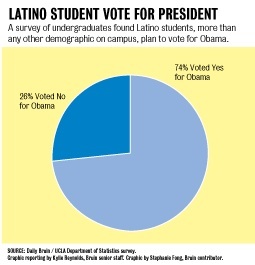More than any other demographic polled, Latino undergraduate students at UCLA are likely to support President Barack Obama in the upcoming presidential election, according to a Daily Bruin/UCLA Department of Statistics survey conducted between Sept. 24 and Oct. 9.
Of the Latino UCLA students surveyed, 74.1 percent said they plan to vote for Obama, compared to around 60 percent for both white and Asian students.
The response size of black students was too small for valid analysis, according to survey results.
The Democratic support from Latino students at UCLA is reflective of the voting trends of the larger United States Latino population ““ a rapidly growing voter bloc that may influence the election’s outcome.
After black voters, Latino voters are most likely to vote Democratic since the party spearheads programs for the working class, which includes many Latino individuals, said John Zaller, an American politics professor at UCLA.
But many Latinos feel disconnected from the Republican Party, which may also be driving this trend, said Carlos Haro, former assistant director of the UCLA Chicano Studies Research Center.
“The position that Latinos are taking, especially (those of) Mexican origin, (is) that the Republicans are not their party ““ (that) they don’t relate to me, they don’t identify with me, they’re not helping me,” Haro said.
As one of the fastest growing demographics in the U.S., the Latino population will likely hold sway in future political elections, Haro said. Latinos accounted for more than half of the population growth of the U.S. in the past decade and currently make up 16 percent of the population, according to the 2010 U.S. Census report.
While the Democratic vote is likely secured in California ““ the state with the highest number of Latinos ““ the Latino population might be key in influencing election outcomes in other states, Haro said. According to a survey conducted last month by Latino Decisions, a firm that gauges Latino public opinion, more than 70 percent of Latino voters in six swing states said they would vote for Obama.
Meanwhile, few Latino UCLA students surveyed said they plan to vote for Republican candidate Mitt Romney. Romney’s conservative policies ““ particularly in regards to immigration ““ have turned off some Latino members of UCLA’s campus.
The candidate has lagged behind Obama in Latino voter support by around 40 percentage points according to a CNN poll taken last month.
With Election Day less than one week away, the former Massachusetts governor has been increasing efforts to attract the Latino vote, appearing on Spanish television channels and airing more Spanish-language advertising. He has cited in his campaign the higher-than-average unemployment rate for Latinos ““ 10 percent ““ and Obama’s lack of substantial immigration reform as reasons Latino voters should turn to the Republican party.
“I am convinced that the Republican Party is the rightful home of Hispanic Americans,” Romney said in a September speech to the U.S. Hispanic Chamber of Commerce.
At the Republican National Convention, the party laid out a platform that was tough on illegal immigration, including a provision that would require employers to check the immigration status of their workers. The platform would also deny federal funding to universities that give in-state tuition to undocumented students.
Representatives from the Romney campaign could not be reached for comment.
These kinds of policies do not appeal to many Latino voters, who often know a friend or relative who is undocumented, Haro said.
Robert Romero, an associate professor of Chicana/o studies at UCLA, said he is opposed to Republican anti-illegal immigration policies because he personally knows undocumented students at UCLA. Many of these students have had to commute or drop out of school for quarters at a time to afford tuition, he added.
“(The Republicans) just seem out of touch, they don’t know what we’re going through. … We’re infuriated and so alienated,” Romero said, placing his hands across his heart.
Obama, however, has not been soft on illegal immigration either, Zaller said. During his term, the president has been strong on border enforcement and cracked down on employers of undocumented individuals, Zaller added. The number of individuals deported during Obama’s term has reached highs not seen since the 1950s, according to a New York Times article published in June.
Still, Obama is more pro-immigration than the majority of Republicans, Zaller said.
In June, national Latino support for Obama jumped after he issued an executive order to stop deporting undocumented youth who excel in high school or serve in the military.
According to Zaller, Latinos are also more likely to vote for Obama because of programs geared toward the working class, such as Obamacare ““ programs Romney has said he plans to downsize if he takes office.
But Nadia Andrade, a fourth-year American literature and culture student, said she does not think Obama is an ideal candidate ““ she in particular dislikes the high number of immigrants deported under his administration. She said she would still support Obama, however, because of these programs that tailor more to the low-income class.
“Obama fights for more things that help our community,” Andrade said. “He doesn’t have a corporate mindset.”
Regardless of this year’s election results, the fast-growing number of Latinos in the U.S. will increasingly affect elections in the future ““ a fact candidates need to be aware of, Haro said.
Email Taketa at ktaketa@media.ucla.edu.
